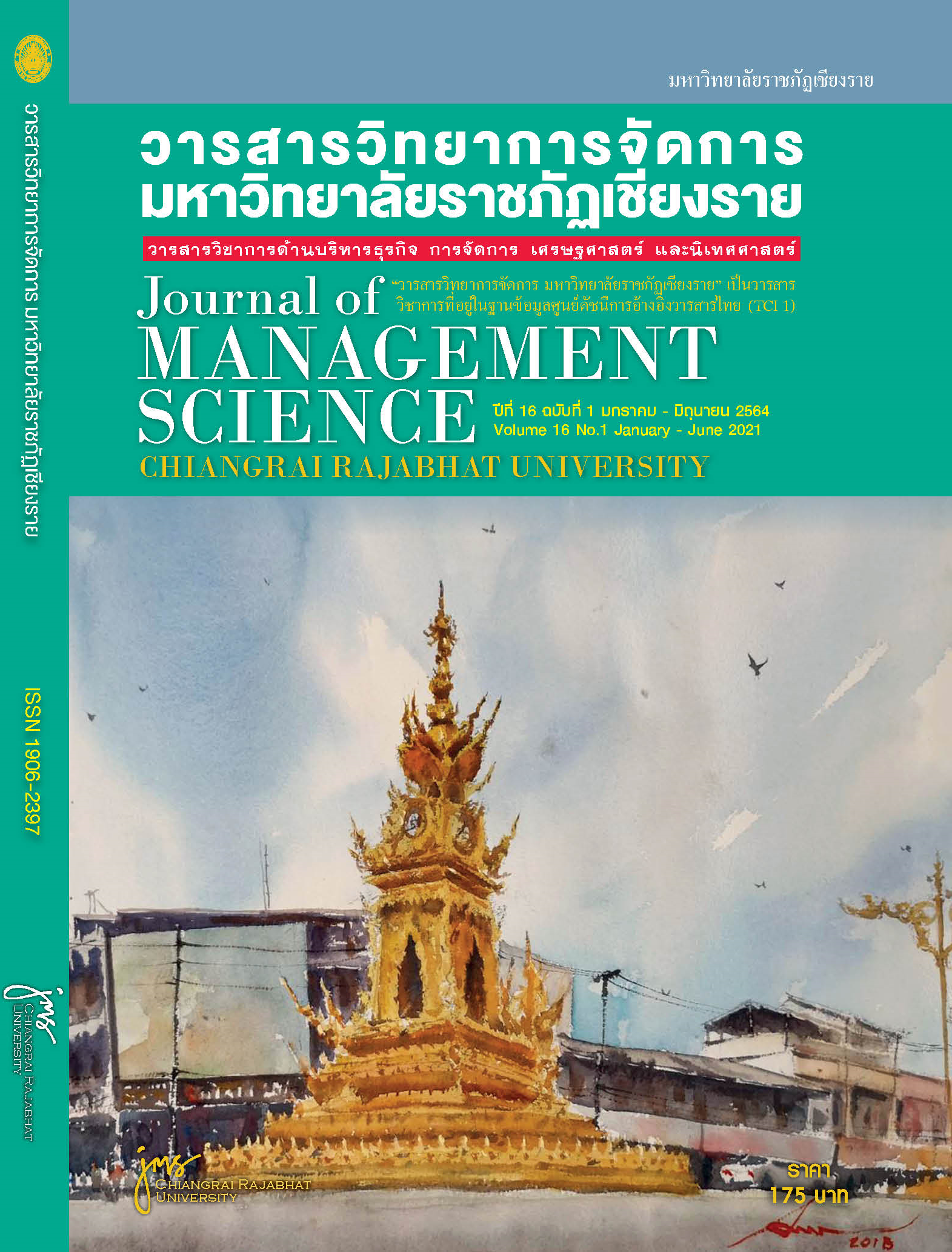การวิเคราะห์ปัจจัยเชิงสาเหตุที่ส่งผลต่อการเจริญเติบโตอย่างยั่งยืนของบริษัทที่จดทะเบียน ในตลาดหลักทรัพย์แห่งประเทศไทย
Main Article Content
บทคัดย่อ
การวิจัยครั้งนี้มีวัตถุประสงค์ของการศึกษา เพื่อวิเคราะห์ปัจจัยเชิงสาเหตุที่ส่งผลต่อการเจริญเติบโตอย่างยั่งยืนของบริษัทที่จดทะเบียนในตลาดหลักทรัพย์แห่งประเทศไทย รูปแบบงานวิจัยเป็นแบบเชิงปริมาณ (Quantitative Research) กลุ่มตัวอย่างที่ใช้ศึกษา คือ บริษัทที่จดทะเบียนในตลาดหลักทรัพย์แห่งประเทศไทย ในทุกกลุ่มอุตสาหกรรม โดยเก็บข้อมูล 5 ปีย้อนหลัง ตั้งแต่ปี 2556-2560 ประชากรที่ใช้ในการวิจัย มีจำนวน 537 บริษัท และมีบริษัทที่เป็นไปตามหลักเกณฑ์ในการศึกษาครั้งนี้มีจำนวนทั้งสิ้น 334 บริษัท โดยการศึกษาใช้แบบจำลองสมการโครงสร้างเชิงเส้นสำหรับการวิเคราะห์อิทธิพล (Path Analysis) ด้วยโปรแกรมสำเร็จรูป
จากการศึกษา พบว่า คุณภาพงานสอบบัญชี โครงสร้างการเป็นเจ้าของ และระบบการควบคุมภายในที่ดีมีความสัมพันธ์ทางลบต่อการจัดการกำไร เนื่องจากระบบการควบคุมภายในที่ดีหรือการสอบบัญชีที่มีคุณภาพสามารถลดการจัดการกำไรลงได้ หากกิจการมีโครงสร้างการเป็นเจ้าของที่ถือหุ้นโดยรัฐบาล นักลงทุนต่างชาติ และนักลงทุนสถาบัน จะมีกลไกในการกำกับดูแลกิจการที่ดีสามารถลดการจัดการกำไรลงได้ และพบว่า การจัดการกำไรมีความสัมพันธ์ทางลบต่อการเจริญเติบโตอย่างยั่งยืน ส่วนโครงสร้างเงินทุน มีความสัมพันธ์ทางบวกต่อการเจริญเติบโตอย่างยั่งยืน นั่นหมายความว่า ต้นทุนของเงินทุนที่มาจากหนี้สิน เป็นส่วนใหญ่จะทำให้ธุรกิจสามารถขยายกิจการ มีสภาพคล่องในการดำเนินงาน ทำให้ธุรกิจสามารถเจริญเติบโตไปได้อย่างต่อเนื่องและยั่งยืน อย่างไรก็ตามศึกษาครั้งนี้ไม่พบความสัมพันธ์ของโครงสร้างเงินทุนที่ส่งผลต่อการจัดการกำไร และไม่พบผลกระทบของระบบการควบคุมภายในที่ส่งผลต่อการเจริญเติบโต อย่างยั่งยืน
Article Details
ทัศนะและข้อคิดเห็นของบทความที่ปรากฏในวารสารฉบับนี้เป็นของผู้เขียนแต่ละท่าน ไม่ถือว่าเป็นทัศนะและความรับผิดชอบของกองบรรณาธิการ
เอกสารอ้างอิง
Ahmad Ahmadpour1, Masoumeh Shahsavari. (2016). Earnings management and the effect of earnings quality in relation to bankruptcy level (Firms listed at the tehran stock exchange). Iranian Journal of Management Studies (IJMS), 9(1), 77-99.
Chih-Ying Chen, Chan-Jane, Lin and Yu-Chen, Lin. (2008). Audit partner yenure, audit firm tenure, and discretionary accruals: Does long Auditor tenure impair earnings quality?. Contemporary accounting research explore this. View Issue TOC, 25(2), 415–445.
Dechow, P. M. and Schrand C. M. (2000). Earnings quality. United States of America : The Research Foundation of CFA Institute.
Doyle Jeffrey, (2007). Accruals quality and internal control over financial reporting. The Accounting Review, 82(2), 1141-1170.
Febriela Sirait Sylvia Veronica Siregar. (2014). Dividend payment and earnings quality : Evidence from Indonesia. International Journal of Accounting and Information Management, 22(2), 103 – 117.
Han, Li. (2015). Managerial ability and internal control quality: Evidence from China. International Journal of Financial Research, 6(2), 2015.
Hashim, H. A. and Suseladevi, S. (2006). Corporate governance, ownership structure & earning quality : Malaysian evidence, Kuala Lumpur:, Faculty of Management & Economics, University Malaya.
Hafiza Aishah Hashim. (2014). Corporate governance ownership structure and earnings Quality : Malaysian evidence. Kuala Lumpur: Faculty of Business and Accountancy, Universiti Malaya.
Iram, Naz. (2018). Impact of firm size and capital structure on earnings management: evidence from pakistan. International Journal of Contemporary Business Studies, 2(12), 20-31.
Jensen, M and Meckling, W. (1976). Theory of the firm: managerial behavior, agency costs and capital structure. Journal of Financial Economics, 3(1), 11- 25
Jun, Guo, Pinghsun, Huang, Yan, Zhang, et al. (2015). Foreign ownership and real earnings management : evidence from japan. Journal of International Accounting Research, 14(2), 185-213.
Ken Y. Chen, Kuen-Lin Lin and Jian Zhou. (2005). Audit quality and earnings management for Taiwan IPO firms. Managerial Auditing Journal, 20(1), 86 – 104.
Koh, P-S. (2003). On the association between institutional ownership and aggressive corporate earnings management in Australia. The British Accounting Review, 35(2), 105-128
Li-Lun, Liu1 and Yu-Ting, Huang. (2016). The relationship between supply chain CPAs, CSR and discretionary accruals. International Business Research, 9(1), 1903-1915.
Mahdi, Noori and Mohamadreza Shorvarzy. (2015). The impact of the Internal control quality on cash flow and earnings quality. Indian Journal of Natural Sciences, 6(31), 201 - 2015.
Mohammad, Reza. (2016). Audit quality and earning management in Tehran Stock Exchange Listed Companies. International Journal of Academic Research in Accounting, Finance and Management Sciences, 6(1), 142–149.
Rusmin, Rusmin. (2010). Auditor quality and earnings management : Singaporean evidence. Managerial Auditing Journal, 25(7), 618 – 638.
Serghiescua Laura, (2014). Determinant factors of the capital structure of a firm - an empirical analysis. Procedia Economics and Finance, 15(4), 1447 – 1457.
Sharma, S. V, et al. (2006). A common signaling cascade may underlie ‘addiction’ to the Src, BCR-ABL, and EGF receptor oncogenes. Cancer Cell, 10, 425–435.
Sulaiman, Mousellia, Aziz, Jaafarb and John, Goddardb. (2013). Accruals quality, stock returns and asset pricing : Evidence from the UK. International Review of Financial Analysis, 30(12), 203–213.
T. Velnampy and J. Aloy Niresh. (2012). The Relationship between capital structure & profitability. Global Journal of Management and Business Research, 12(13), 12 – 20
Velury, U. and Jenkins, D. S. (2006). Institutional ownership & the quality of earnings. Journal of Business Research, 59, 1043-1051.


